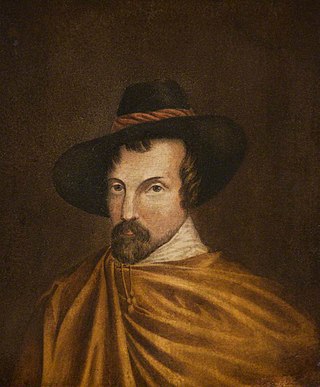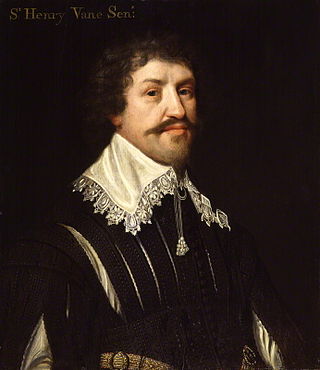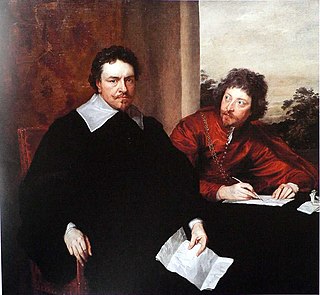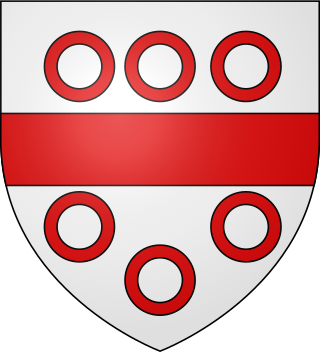Related Research Articles

The Long Parliament was an English Parliament which lasted from 1640 until 1660. It followed the fiasco of the Short Parliament, which had convened for only three weeks during the spring of 1640 after an 11-year parliamentary absence. In September 1640, King Charles I issued writs summoning a parliament to convene on 3 November 1640. He intended it to pass financial bills, a step made necessary by the costs of the Bishops' Wars in Scotland. The Long Parliament received its name from the fact that, by Act of Parliament, it stipulated it could be dissolved only with agreement of the members; and those members did not agree to its dissolution until 16 March 1660, after the English Civil War and near the close of the Interregnum.

Ferdinando Fairfax, 2nd Lord Fairfax of Cameron was an English nobleman and politician who sat in the House of Commons at various times between 1614 and 1648. He was a commander in the Parliamentary army in the English Civil War.

Sir William Brereton, 1st Baronet, 13 September 1604 – 7 April 1661, was an English religious Independent, author, and landowner from Cheshire. He was Member of Parliament for Cheshire at various times between 1628 and 1653, and during the First English Civil War, commander of Parliamentarian forces in the North Midlands.

Sir Richard Wynn, 2nd Baronet was a Welsh courtier and politician who sat in the House of Commons at various times between 1614 and 1649.

Thomas Wentworth, 1st Earl of Cleveland, was an English landowner and Royalist general during the Wars of the Three Kingdoms, described by one historian as a "much under-rated field commander". A distant relative of Thomas Wentworth, 1st Earl of Strafford, executed by Parliament in May 1641, his son Thomas Wentworth, 5th Baron Wentworth, also served in the Royalist army and predeceased him in March 1665.

The Court of Wards and Liveries was a court established during the reign of Henry VIII in England. Its purpose was to administer a system of feudal dues; but as well as the revenue collection, the court was also responsible for wardship and livery issues.
Sir Hugh Cholmeley, 1st Baronet was an English landowner and Member of Parliament who sat in the House of Commons at various times between 1624 and 1643. He was initially a Parliamentarian but later a Royalist leader during the English Civil War. His name is sometimes spelt Cholmley.

Sir Henry Vane, known as the Elder to distinguish him from his son, was an English politician who sat in the House of Commons at various times between 1614 and 1654. He served King Charles in many posts including secretary of state, but on the outbreak of the English Civil War joined the Parliamentary cause. He was the third cousin of Francis Fane, 1st Earl of Westmorland.

Sir John Glanville the younger, was an English politician who sat in the House of Commons at various times between 1614 and 1644. He was Speaker of the English House of Commons during the Short Parliament. He supported the Royalist cause in the English Civil War.

George Fleetwood (1623–1672) was an English major-general and one of the regicides of King Charles I of England.
Sir John Wray, 2nd Baronet was an English politician who sat in the House of Commons at various times between 1614 and 1648. He supported the Parliamentary cause in the English Civil War.

Sir Philip Mainwaring was an English politician who sat in the House of Commons variously between 1625 and 1661.
Sir Robert Cooke was an English politician who sat in the House of Commons between 1640 and 1643. He served in the Parliamentarian army in the English Civil War.

Sir John Mallorie was an English politician who sat in the House of Commons from 1640 to 1642. He fought on the Royalist side in the English Civil War.

William Mallory of Studley Royal, Yorkshire was an English politician who sat in the House of Commons variously between 1614 and 1642. He supported the Royalist side in the English Civil War. His father, John Mallory, was also an MP of Ripon.
Sir William Fleetwood of High Lodge, Woodstock Park, Oxfordshire was an English courtier and politician who sat in the House of Commons in 1640 and again from 1661 to 1674.

Sir Thomas Lucas, was a professional soldier from Lexden, just outside Colchester in Essex, England, who served with the Dutch States Army in the Eighty Years War and later fought in the Irish Confederate Wars.
Sir Charles Williams (1591–1641) was a Welsh politician who sat in the House of Commons from 1621 to 1622 and from 1640 to 1641.

Sir Gilbert Hoghton, 2nd Baronet was an English politician who sat in the House of Commons variously between 1614 and 1640. He was a Royalist leader during the English Civil War.
John Brooke, 1st Baron Cobham was an English politician who sat in the House of Commons at various times between 1614 and 1643. He supported the Royalist cause in the English Civil War.
References
- Jack, Sybil M (January 2008) [2004]. "Fleetwood, Sir Miles (d. 1641)". Oxford Dictionary of National Biography (online ed.). Oxford University Press. doi:10.1093/ref:odnb/66616.(Subscription or UK public library membership required.)
- Attribution
 This article incorporates text from a publication now in the public domain : Firth, Charles Harding (1889). "Fleetwood, Charles". In Stephen, Leslie (ed.). Dictionary of National Biography . Vol. 19. London: Smith, Elder & Co. p. 261.
This article incorporates text from a publication now in the public domain : Firth, Charles Harding (1889). "Fleetwood, Charles". In Stephen, Leslie (ed.). Dictionary of National Biography . Vol. 19. London: Smith, Elder & Co. p. 261.